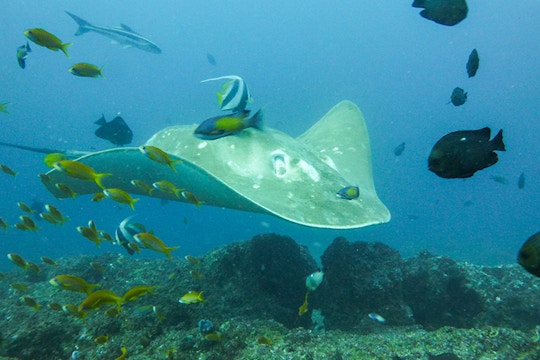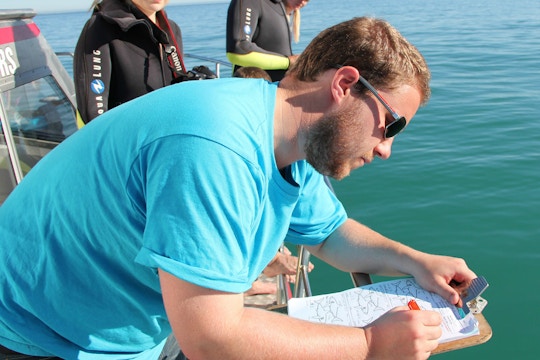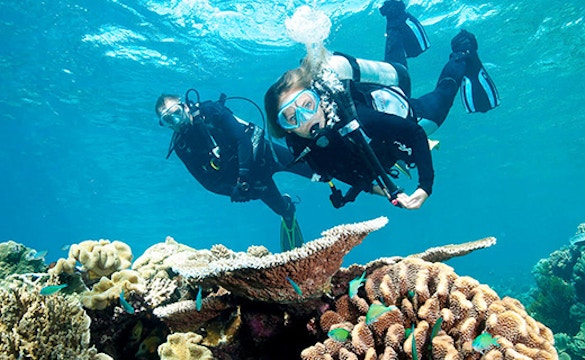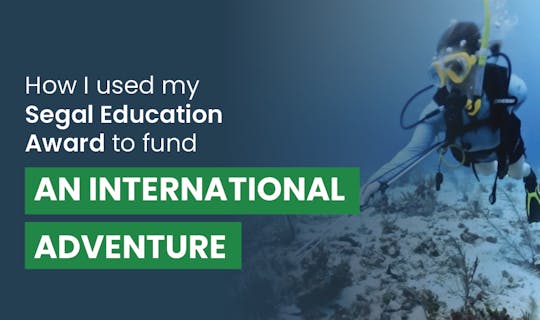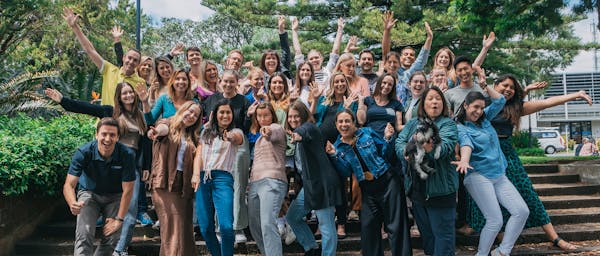I gained confidence in meeting new people and trying new skills. I loved the sense of satisfaction knowing I was working with a team dedicated to making a difference.
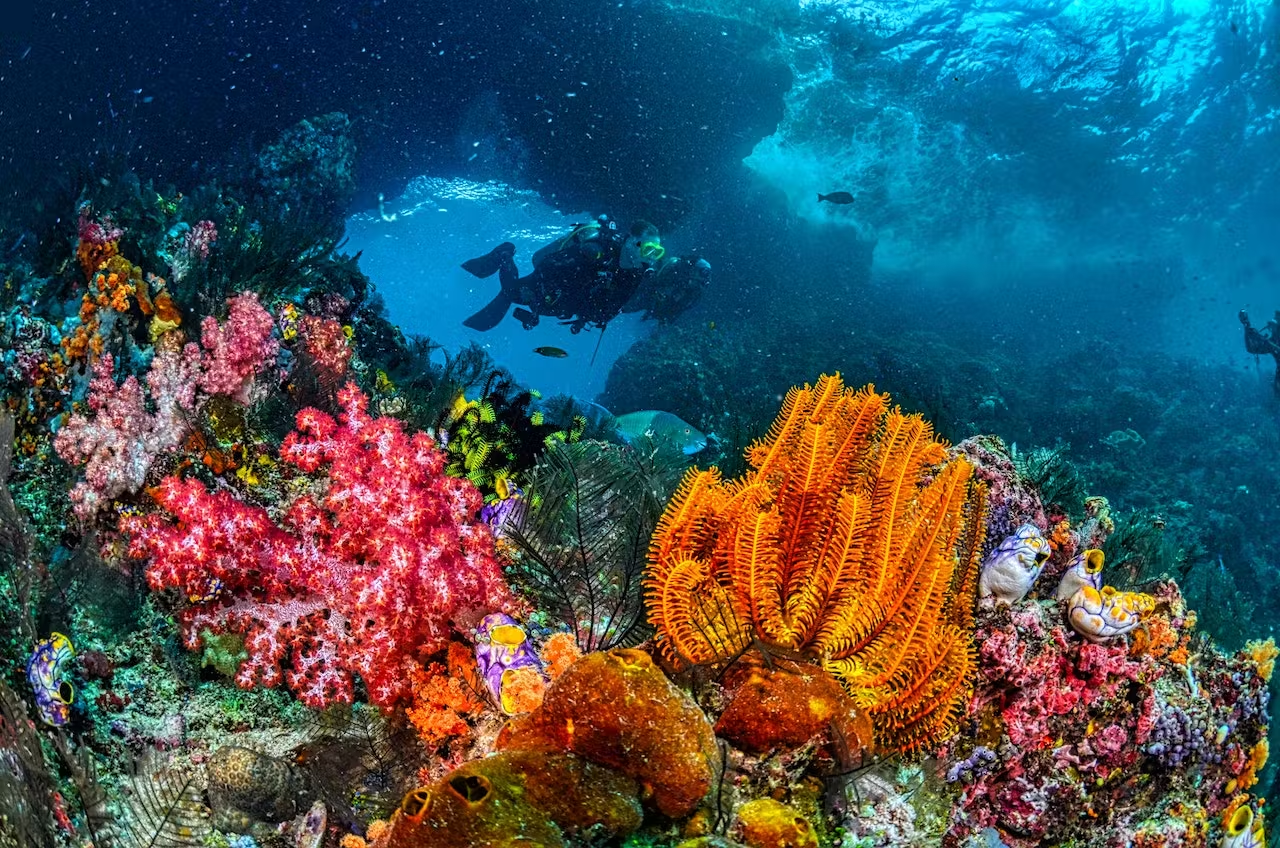
Marine Conservation Volunteer Program in Trinidad and Tobago
Purpose
Start dates
Duration
Volunteer hours
Age
Accommodation
Who is going?
Group video calls
Once you have secured your place, join regular video calls to meet your Program Manager and other volunteers before your trip.
This program is ideal for:
Volunteers who love being in the ocean, want to scuba dive, and are passionate about marine conservation.
Project details
International Volunteer’s Marine Conservation project provides volunteers with the unique opportunity to help restore and protect the coral reef population that provides over 120 species of wildlife a protected refuge to call home. There is also an opportunity from March - August to assist in the protection of the endangered Turtle population. Volunteers will gain experience in scuba diving, marine conservation and turtle conservation efforts while supporting reef life and the local animal population that depends on this diverse ecosystem to survive.
What to expect and how you'll make an impact
The coral reefs of Tobago are an unsung treasure that need to be protected. Globally coral reefs are being damaged by a range of human factors, including global warming, which is leading to the rise in the average sea-surface-temperature. The Caribbean alone has lost 50% of its coral reefs in the last 50 years and the conservation of such a natural underwater marvel is more important now than ever.
On top of that, marine debris represents a significant threat to the ecosystem and is having a devastating impact on marine life in Trinidad and Tobago. Volunteers are able to help to reduce these effects by using scuba diving skills to help with important conservation efforts. During certain times of the year, there is also opportunity to provide support to the local endangered Turtle population, along with education and outreach opportunities for the local community through engagement with various youth programs.
These initiatives include:
Bucco Reef Conservation
- Assisting in efforts to protect the over 120 species of marine life
- Learning about environmental issues and developing solutions to support the regeneration of the reef
- Gathering research and data as it relates to the changing biodiversity of the reef and it’s ecosystem
- Conducting outreach and awareness campaigns
Turtle Conservation (April - August)
- Locating nesting turtles and monitoring their behavior
- Collecting turtle eggs as a measure of protection
- Constructing and maintaining hatcheries to protect eggs from predators
- Tracking, counting, and tagging seas turtles
- Assisting with daily beach patrols *Please note, the Turtle Conservation work occurs nightly from 8 PM until the early hours of the morning.
Education and Outreach
- Working with local children over the Easter and summer holidays to help engage them in learning about marine conservation
- Developing program guides and learning materials for the community
Please note, while preferences can be noted on your application, the work assigned to you will be entirely dependent on the needs of the placements at the time you are volunteering, so we ask volunteers to be open and flexible when it comes to placement assignments.
Why do Marine Conservation volunteering in Crown Point with IVHQ?
As a Marine Conservation volunteer in Trinidad and Tobago you’ll be adding value to the local community, while also developing personally and professionally by:
- Supporting local efforts to protect marine life
- Learning about environmental issues and solutions
- Developing your communication skills
- Gaining scuba and marine conservation experience
- Immersing yourself in Caribbean culture
- Discovering Tobago’s stunning coral reefs
Volunteer requirements
Volunteers under the age of 18 must be accompanied by a parent or guardian, provide IVHQ with parental consent in order to participate on the program, and may be asked to provide additional document to the local team.
Volunteers aged 16 or 17 on their start date, if unable to obtain a criminal background check, can provide two character reference letters instead
Volunteers aged over 18 on their start date are required to provide a criminal background check to IVHQ before departure.
All volunteers must speak English and have adequate volunteer travel insurance.
This project is currently not accepting applications.
Check out this similar project in Belize
Not sure which program to join?
Get personalized recommendations >
Who is going?
Group video calls
Once you have secured your place, join regular video calls to meet your Program Manager and other volunteers before your trip.
Trinidad and Tobago photo gallery









































































Academic course credit

Academic course credit
Gain course credit from your college or university and meet your academic requirements when completing a volunteer abroad program with International Volunteer HQ!
Learn about course creditLocation

Location
The IVHQ Trinidad and Tobago volunteer program is based in Crown Point, a small coastal village on the island of Tobago. This is the smaller of the Twin Islands of Trinidad and Tobago in the Caribbean.
The island of Tobago is known for its stunning white sand beaches, turquoise waters, abundance of wildlife, and delicious seafood. The island is mainly untouched by mass tourism, making it an amazing place to reconnect with nature. There are more than 260 species of birds on the island, a diverse range of vibrant coral reefs to explore, and an abundance of waterfalls and rainforest you can hike through.
Crown Point is where orientation and general administration is carried out by our local team. Volunteer placements are between 15 - 30 minutes on public transportation from our program location.
Arrival and orientation
The Trinidad and Tobago Program has available start dates on the second and fourth Monday of each month, and volunteers can choose from a duration of 1 - 4 weeks.
We ask that you arrive at A.N.R. Robinson International Airport the Sunday prior to your start date. Your airport pickup is included in your program fee, and the local team can provide a pickup anytime on Sunday. The airport is approximately 15 minutes from the volunteer accommodation.
Orientation is provided by our Trinidad and Tobago team and begins first thing Monday morning. Orientation covers everything you need to know for your volunteer program in Trinidad and Tobago – an introduction to the country, Trinidad and Tobago customs, rules and expectations, safety, travel opportunities in Trinidad and Tobago, and an introduction to your project and placement. The orientation will also give you a chance to meet other volunteers and swap contact details for weekend travel and socializing.
Your volunteer placement will begin the following day (Tuesday).
Volunteer schedule example
First day
You will be taken to your placement by a local team member and introduced to the placement staff.
Weekdays
You may have a morning or afternoon shift, or both, and can expect to work a minimum of 3 hours, Monday through Friday. Please note that the schedule below is an example schedule only. Start time and daily workload depends on your chosen project. A typical daily schedule would be as follows:
| 7:30 AM | Breakfast at the volunteer accommodation. |
| 8:00 AM | Travel to placement to join local placement staff and begin work on your project. |
| 12:00 PM | Break for lunch. |
| 1:00 PM | Work at the placement commences if you have been assigned with an afternoon shift. |
| 3:30 PM | You are free to travel back to the volunteer house to relax, go sightseeing or do some shopping. |
Please note that the schedule may occasionally change due to weather, public or school holidays, or other unforeseen events that could affect your placement. We recommend checking in advance whether your intended travel dates coincide with any public or school holidays.
Weekends
With weekends free, you’ll be able to explore all that Tobago and neighboring islands have to offer, including the country’s distinctive food, music and culture.
Weekends can be spent exploring Tobago, island hopping or joining an add-on tour. The local team will also have great recommendations for things to see and do locally, which they will discuss with volunteers as part of orientation.
Accommodation and WiFi
Immerse yourself in the vibrant culture of Crown Point while enjoying the comforts of our two-story volunteer apartment. Nestled within walking distance of picturesque local beaches and a variety of authentic Tobagonian eateries, the accommodation offers a cozy and communal living space beyond your volunteer duties.
Expect to share a bedroom with 1 to 2 fellow volunteers. While bedrooms are typically gender-specific, mixed-gender arrangements may be necessary during peak program times. If this arrangement does not suit you, alternative accommodations can be arranged. Each bedroom is furnished with single beds and provided with clean linens weekly.
Within the apartment, you’ll find a shared living area, a bathroom, air conditioning, reliable Wi-Fi, and a fully equipped kitchen for communal meals and gatherings. The accommodation is cleaned twice weekly, with volunteers responsible for maintaining their personal spaces.
For those seeking added privacy and comfort, you can inquire about the private studio apartment upgrade, featuring a king bed, air conditioning, private bathroom, and kitchen facilities, available for an additional fee, but subject to availability. Pre and post-program accommodations can also be arranged upon request. Please ask your IVHQ Program Manager for more details.
Stay connected during your stay by bringing an unlocked mobile phone and purchasing a local SIM card upon arrival in Trinidad and Tobago. Our local team will assist you with this during your Program Orientation, ensuring you have seamless communication throughout your volunteer experience. Additionally, Wi-Fi is provided at your volunteer accommodation for your convenience.
Laundry facilities are not available on-site, but can be accessed in town (approximately 15 minutes driving) at a cost of approximately $6 ($40TNT) per load.
Meals
Volunteers are provided with light breakfast items in a self-serve manner each day, which include toast, cereal, tea, coffee and creamer. You are welcome to purchase your own groceries to supplement these items for your personal preferences.
Volunteers are responsible for their own lunch and dinner each day. You will have access to your own kitchen in the accommodation, and groceries can be purchased locally so you can prepare your own meals. There are a few restaurants within walking distance of the accommodation if you’d prefer to eat out. We recommend budgeting around US$10 - 30 per meal if you choose to eat at a local restaurant or cafe.











Pricing
Spots are limited. For a Registration Fee of just US$329 (approximately $329) you secure your spot and unlock all our preparation and training tools.
You don't need to worry about paying your Program Fee until you get closer to your start date.
|
Duration
|
Program Fee
Due 30 days before you start, or within 48 hours if you register inside of 30 days. Covers the cost of hosting you.
|
|---|---|
| 1 week | $630 Equivalent to $90/day |
| 2 weeks | $1,030 Equivalent to $74/day |
| 3 weeks | $1,395 Equivalent to $66/day |
| 4 weeks | $1,739 Equivalent to $62/day |
- All programs attract a Registration Fee of US$329 (approximately $329) in addition to the Program Fee. This covers all pre-departure support services.
- A 5% international banking fee is added at point of payment.
- Recommended spending money: Volunteers in Trinidad and Tobago generally find US$200 - $300 per week to be sufficient for additional expenses.
- Light breakfast supplies
- Airport pick-up
- Accommodation
- 24/7 in-country emergency support
- In-country program orientation
- Pre-departure support from your Program Manager
- Personalized preparation tools, guides and check lists
- Access to IVHQ’s preferred insurance and flights partners
- Comprehensive in-country day to day support and guidance
- Discounts on travel and tour add-ons
- Certificate of International Volunteer Service
Learn more about what's included in your IVHQ Registration Fee and Program Fee.
- Lunch and dinner
- Transport to and from your placement each day
- Return to the airport when your program finishes
- Flights
- Visa (if required), travel insurance (mandatory), vaccinations, criminal background check.
- Personal spending money for snacks, laundry, public transportation, drinks and leisure activities during your free time.
Popular add-ons & experiences in Crown Point
Take your volunteer experience to the next level with these popular add-ons and experiences. Explore your options below and learn how to book them once you've been accepted onto the IVHQ Crown Point program.
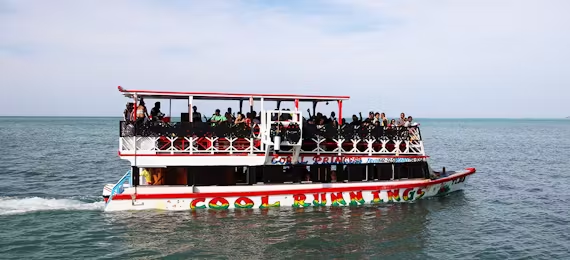
Join us for an exploration of Tobago’s coastal treasures that promises memories to last a lifetime!

Arriving early or departing a day after your program has finished? Book your extra nights of accommodation.
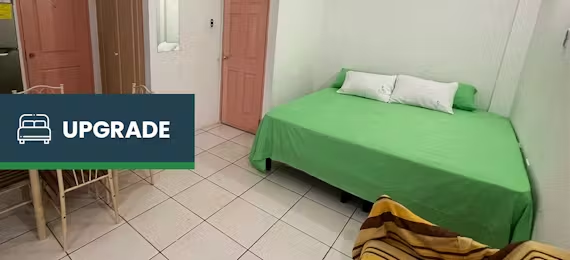
Stay in Trinidad and Tobago longer with extra nights of accommodation in the private studio upgrade.
Check what's required to visit Trinidad and Tobago
Entry requirements can change at any time, so it's important you monitor this right up until you depart for your trip.
Safety and support
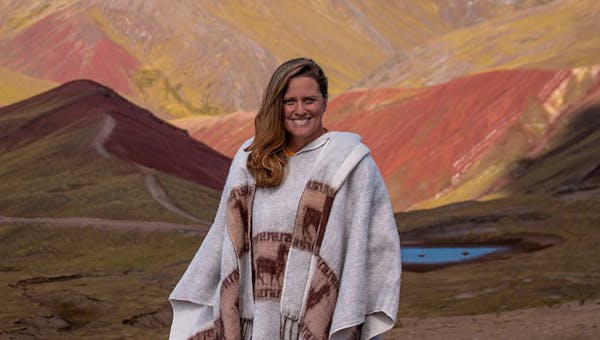
Safety and support
IVHQ follows best practice and industry-leading health and safety procedures, which are regularly reviewed and optimized as part of the B Corporation recertification.
- All volunteers encouraged to complete our interactive pre-departure training.
- All local teams trained on best practice volunteer management & First Aid.
- All IVHQ programs are required to adhere to IVHQ's Risk Management Policy.
- All volunteers have access to 24/7 in-country support from our local team.
Essential country information
Essential country information
| Capital | Port of Spain |
| Population | 1,412,090 country population |
| Languages | English |
| Currency | Trinidad & Tobago Dollar (TT$) |
| Time zone | UTC-4:00 |
Weather and climate
The climate of Trinidad and Tobago is tropical, with high relative humidity. The coolest months are December to February, when the average minimum temperature ranges from lows of 71 °F (22°C) and highs of 86 °F (30°C). The warmest months are August to October, which have an average maximum temperature of about 89 °F (32 °C).
What recent volunteers said about their IVHQ experience
The whole experience was heartwarming, eye-opening and humbling, I really enjoyed it and I can’t wait to do it again.
This is a valuable lifetime experience that will enhance your confidence and you will feel very good about yourself for volunteering to help the less fortunate. There are so many benefits for both the volunteers and the recipients. IVHQ truly offers a win/win program for all participants.
To read all reviews, visit our reviews page.
Latest blog posts
Other projects you may be interested in




















